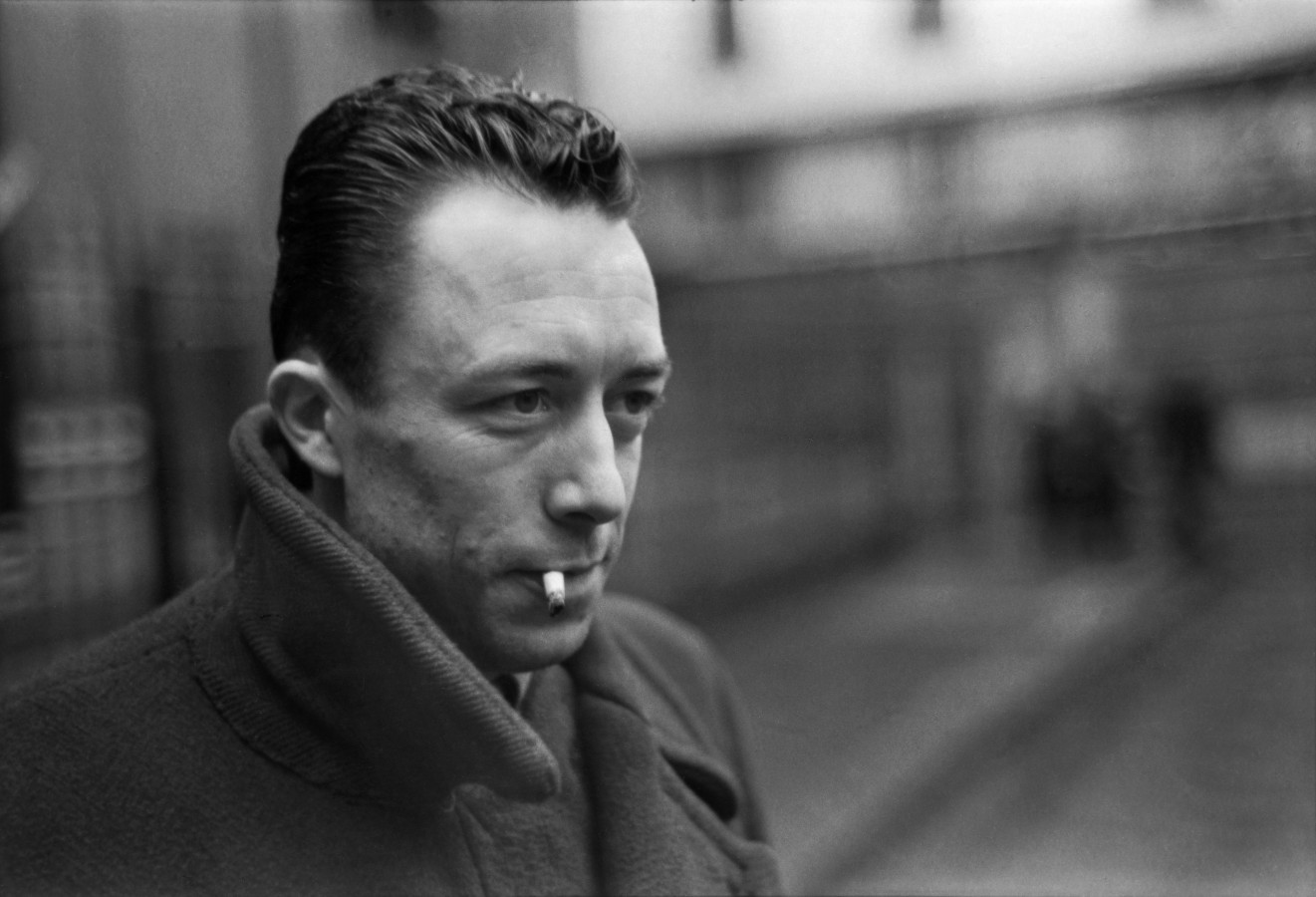<Back to Index>
- Fiction Writer Svetoslav Konstantinov Minkov, 1902
- Writer and Philosopher Albert Camus, 1913
PAGE SPONSOR
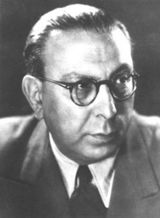
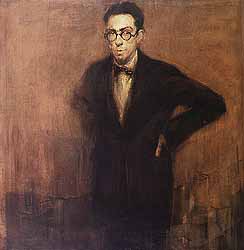
Svetoslav Konstantinov Minkov (Bulgarian: Светослав Константинов Минков) (12 February 1902 – 22 November 1966) was a Bulgarian absurdist fiction writer.
Minkov was born in Radomir in 1902 in a military family. His older brother Asen died in the Second Balkan War, while his other brother Ivan, a member of the Bulgarian Communist Party, committed suicide in 1925 to evade arrest by the oppressive Tsarist authorities. Minkov received his primary education in Radomir, and graduated from a high school in Sofia.
His sister Teodora introduced him to the Bulgarian literary circles of the 1920s. He published his first work - Newton's binomial in the "Bulgaran" magazine in 1920. He was later enrolled in a military college in Austria, where he studied the works of Goethe, Nietzsche, Edgar Allan Poe, Henrik Ibsen and the Russian classical authors. Minkov was known for his eccentric character and suffered from bizarre, paranoid phobias, pervasive obsessive thoughts and nightmares.
He studied at Sofia University for a brief period of time before departing for Munich in 1922. There he spent some of his best years, paying more attention to contacts with the local bohemians than to studies. He came back to his native country in 1923, and started working as a librarian for the SS. Cyril and Methodius National Library. Before 1942, Minkov visited a number of countries in Europe, Asia and South America. Between 1942 and 1943 he worked in the Bulgarian embassy in Tokyo. After 1944, he began working in a number of Communist - oriented newspapers. From 1954 to 1962 he was a chief editor at the "Bulgarski pisatel" printing house.
Minkov died in Sofia on November 22, 1966.
Svetoslav Minkov is considered a pioneer of Bulgarian science fiction. He is a unique figure in Bulgarian literature - his talent and style were largely isolated from the local literary tendencies of the 1920s and 1930s, and he had no followers.
His works primarily concern the loss of identity in the technocratic world, social uniformity under the influence of technology, the uncertainty of morality and values and the existential aspects of boredom. Minkov vividly expresses his ideas by means of parody, diabolism, sarcasm and absurdism.
He also wrote numerous tales for children, studies on Japanese culture, and translated the tales of Sheherezade in Bulgarian.

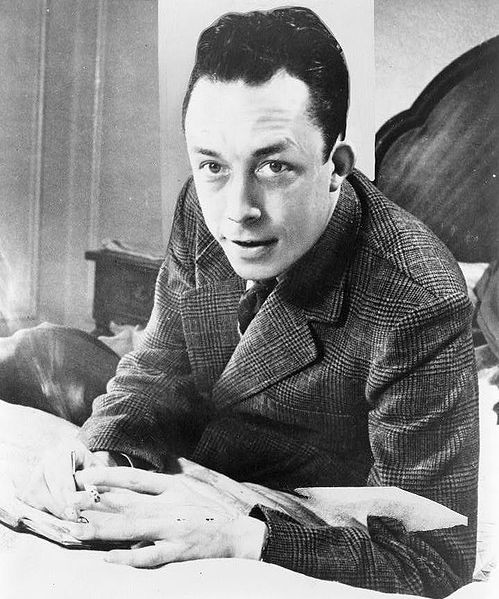
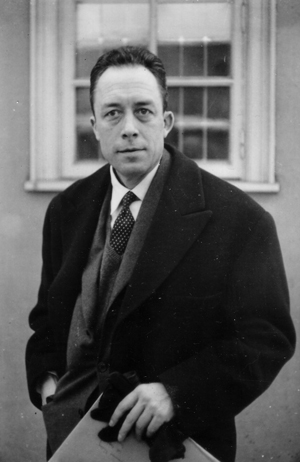
Albert Camus (7 November 1913 – 4 January 1960) was a French author, journalist, and philosopher of the 20th century. In 1949, Camus founded the Group for International Liaisons within the Revolutionary Union Movement, which was opposed to some tendencies of the Surrealist movement of André Breton.
Camus was awarded the 1957 Nobel Prize for Literature "for his important literary production, which with clear - sighted earnestness illuminates the problems of the human conscience in our times". He was the second youngest recipient of the Nobel Prize in Literature, after Rudyard Kipling, and the first African born writer to receive the award. He is the shortest lived of any Nobel literature laureate to date, having died in an automobile accident just over two years after receiving the award.
Although often cited as a proponent of existentialism, the philosophy with which Camus was associated during his own lifetime, he rejected this particular label. In an interview in 1945, Camus rejected any ideological associations: "No, I am not an existentialist. Sartre and I are always surprised to see our names linked..."
Specifically, his views contributed to the rise of the philosophy known as absurdism. He wrote in his essay "The Rebel" that his whole life was devoted to opposing the philosophy of nihilism while still delving deeply into individual freedom.
Albert Camus was born on 7 November 1913 in Dréan (then known as Mondovi) in French Algeria to a Pied - Noir settler family. Pied - Noir was a term used to refer to European colonists of French Algeria until Algerian independence in 1962. His mother was of Spanish descent and was half - deaf. His father Lucien, a poor agricultural worker, died in the Battle of the Marne in 1914 during World War I, while serving as a member of the Zouave infantry regiment. Camus and his mother lived in poor conditions during his childhood in the Belcourt section of Algiers.
In 1923, the bright boy was accepted into the lycée and eventually he was admitted to the University of Algiers. After he contracted tuberculosis (TB) in 1930, he had to end his football activities (he had been a goalkeeper for
the university team) and reduce his studies to part time. To earn
money, he also took odd jobs: as private tutor, car parts clerk and
assistant at the Meteorological Institute. He completed his licence de philosophie (BA) in 1935; in May 1936, he successfully presented his thesis on Plotinus, Néo - Platonisme et Pensée Chrétienne (Neo - Platonism and Christian Thought), for his diplôme d'études supérieures (roughly equivalent to an M.A. thesis).
Camus joined the French Communist Party in the spring of 1935, seeing it as a way to "fight inequalities between Europeans and 'natives' in Algeria." He did not suggest he was a Marxist or that he had read Das Kapital, but did write that "[w]e might see communism as a springboard and asceticism that prepares the ground for more spiritual activities." In 1936, the independence minded Algerian Communist Party (PCA) was founded. Camus joined the activities of the Algerian People's Party (Le Parti du Peuple Algérien), which got him into trouble with his Communist party comrades. As a result, in 1937 he was denounced as a Trotskyite and expelled from the party. Camus went on to be associated with the French anarchist movement.
The anarchist André Prudhommeaux first introduced him at a meeting in 1948 of the Cercle des Étudiants Anarchistes (Anarchist Student Circle) as a sympathizer familiar with anarchist thought. Camus wrote for anarchist publications such as Le Libertaire, La révolution Proletarienne and Solidaridad Obrera (Workers' Solidarity, the organ of the anarcho - syndicalist CNT (National Confederation of Labor)). Camus stood with the anarchists when they expressed support for the uprising of 1953 in East Germany. He again allied with the anarchists in 1956, first in support of the workers’ uprising in Poznań, Poland, and then later in the year with the Hungarian Revolution.
In 1934, he married Simone Hie, a morphine addict, but the marriage ended as a consequence of infidelities on both sides. In 1935, he founded Théâtre du Travail (Worker's Theatre), renamed Théâtre de l'Equipe (Team's Theatre) in 1937. It lasted until 1939. From 1937 to 1939 he wrote for a socialist paper, Alger - Républicain. His work included an account of the peasants who lived in Kabylie in poor conditions, which apparently cost him his job. From 1939 to 1940, he briefly wrote for a similar paper, Soir - Republicain. He was rejected by the French army because of his TB.
In 1940, Camus married Francine Faure,
a pianist and mathematician. Although he loved her, he had argued
passionately against the institution of marriage, dismissing it as
unnatural. Even after Francine gave birth to twins, Catherine and Jean,
on 5 September 1945, he continued to joke to friends that he was not cut
out for marriage. Camus conducted numerous affairs, particularly an
irregular and eventually public affair with the Spanish born actress Maria Casares. In the same year, Camus began to work for Paris - Soir magazine. In the first stage of World War II, the so called Phoney War, Camus was a pacifist. In Paris during the Wehrmacht occupation, on 15 December 1941, Camus witnessed the execution of Gabriel Péri; it crystallized his revolt against the Germans. He moved to Bordeaux with the rest of the staff of Paris - Soir. In the same year he finished his first books, The Stranger and The Myth of Sisyphus. He returned briefly to Oran, Algeria, in 1942.
During the war Camus joined the French Resistance cell Combat, which published an underground newspaper of the same name. This group worked against the Nazis, and in it Camus assumed the nom de guerre Beauchard. Camus became the paper's editor in 1943 and was in Paris when the Allies liberated the city, where he reported on the last of the fighting. Soon after the event on 6 August 1945, he was one of the few French editors to publicly express opposition to the United States' dropping the atomic bomb in Hiroshima. He resigned from Combat in 1947 when it became a commercial paper. It was then that he became acquainted with Jean - Paul Sartre.
After the war, Camus began frequenting the Café de Flore on the Boulevard Saint - Germain in Paris with Sartre and others. He also toured the United States to lecture about French thought. Although he leaned left, politically, his strong criticisms of Communist doctrine did not win him any friends in the Communist parties and eventually alienated Sartre.
In 1949 his TB returned and Camus lived in seclusion for two years. In 1951 he published The Rebel, a philosophical analysis of rebellion and revolution which expressed his rejection of communism. Upsetting many of his colleagues and contemporaries in France, the book brought about the final split with Sartre. The dour reception depressed him and he began to translate plays.
Camus's first significant contribution to philosophy was his idea of the absurd. He saw it as the result of our desire for clarity and meaning within a world and condition that offers neither, which he expressed in The Myth of Sisyphus and incorporated into many of his other works, such as The Stranger and The Plague. Despite his split from his "study partner", Sartre, some still argue that Camus falls into the existentialist camp. He specifically rejected that label in his essay "Enigma" and elsewhere. The current confusion arises in part because many recent applications of existentialism have much in common with many of Camus's practical ideas. But, his personal understanding of the world (e.g., "a benign indifference", in The Stranger), and every vision he had for its progress (e.g., vanquishing the "adolescent furies" of history and society, in The Rebel) undoubtedly set him apart.
In the 1950s Camus devoted his efforts to human rights. In 1952 he resigned from his work for UNESCO when the UN accepted Spain as a member under the leadership of General Franco. In 1953 he criticized Soviet methods to crush a workers' strike in East Berlin. In 1956 he protested against similar methods in Poland (protests in Poznań) and the Soviet repression of the Hungarian revolution in October.
Camus maintained his pacifism and resisted capital punishment anywhere in the
world. He wrote an essay against capital punishment in collaboration with Arthur Koestler, the writer, intellectual and founder of the League Against Capital Punishment.
When the Algerian War began in 1954, Camus was confronted with a moral dilemma. He identified with the pied - noirs such as his own parents and defended the French government's actions against the revolt. He argued that the Algerian uprising was an integral part of the 'new Arab imperialism' led by Egypt and an 'anti - Western' offensive orchestrated by Russia to 'encircle Europe' and 'isolate the United States'. Although favoring greater Algerian autonomy or even federation, though not full scale independence, he believed that the pied - noirs and Arabs could co-exist. During the war he advocated a civil truce that would spare the civilians, which was rejected by both sides, who regarded it as foolish. Behind the scenes, he began to work for imprisoned Algerians who faced the death penalty.
From 1955 to 1956, Camus wrote for L'Express. In 1957 he was awarded the Nobel Prize in literature "for
his important literary production, which with clear - sighted earnestness
illuminates the problems of the human conscience in our times", not for
his novel The Fall, published the previous year, but for his writings against capital punishment in the essay "Réflexions sur la Guillotine" (Reflections on the Guillotine). When he spoke to students at the University of Stockholm,
he defended his apparent inactivity in the Algerian question; he stated
that he was worried about what might happen to his mother, who still
lived in Algeria. This led to further ostracism by French left - wing
intellectuals.
As he wrote in L'Homme révolté (in the chapter about "The Thought on Midday"), Camus was a follower of the ancient Greek 'Solar Tradition' (la pensée solaire). In 1947 – 48 he founded the Revolutionary Union Movement (Groupes de liaison internationale – GLI) a trade union movement in the context of revolutionary syndicalism (Syndicalisme révolutionnaire). According to Olivier Todd, in his biography, 'Albert Camus, une vie', it was a group opposed to some tendencies of the Surrealist movement of André Breton.
His colleagues were Nicolas Lazarévitch, Louis Mercier, Roger Lapeyre, Paul Chauvet, Auguste Largentier, Jean de Boë. His main aim was to express the positive side of surrealism and existentialism, rejecting the negativity and the nihilism of André Breton.
From 1943, Albert Camus had correspondence with Altiero Spinelli who founded the European Federalist Movement in Milan.
In 1944 Camus founded the "French Committee for the European Federation" (Comité Français pour la Féderation Européene – CFFE) declaring that Europe "can only evolve along the path of economic progress, democracy and peace if the nation states become a federation."
From 22 – 25 March 1945, the first conference of the European Federalist Movement was organized in Paris with the participation of Albert Camus, George Orwell, Emmanuel Mounier, Lewis Mumford, André Philip, Daniel Mayer, François Bondy and Altiero Spinelli. This specific branch of the European Federalist Movement disintegrated in 1957 after Winston Churchill's ideas about the European integration rose to dominance.
Camus died on 4 January 1960 at the age of 46 in a car accident near Sens, in Le Grand Fossard in the small town of Villeblevin.
In his coat pocket lay an unused train ticket. He had planned to travel
by train with his wife and children, but at the last minute he accepted
his publisher's proposal to travel with him.
The driver of the Facel Vega car, Michel Gallimard, his publisher and close friend, also died in the accident. In August 2011, the Milan newspaper Corriere della Sera reported a theory that the writer had been the victim of a Soviet plot, but Camus biographer Olivier Todd did not consider it credible. Camus was buried in the Lourmarin Cemetery, Lourmarin, Vaucluse, France.
He was survived by his wife and twin children, Catherine and Jean, who hold the copyrights to his work.
Two of Camus's works were published posthumously. The first, entitled A Happy Death (1970), featured a character named Patrice Mersault, comparable to The Stranger's Meursault. There is scholarly debate as to the relationship between the two books. The second was an unfinished novel, The First Man (1995), which Camus was writing before he died. The novel was an autobiographical work about his childhood in Algeria.
Many writers have addressed the Absurd, each with his or her own interpretation of what the Absurd is and what comprises its importance. For example, Sartre recognizes the absurdity of individual experience, while Kierkegaard explains that the absurdity of certain religious truths prevent us from reaching God rationally. Camus regretted the continued reference to himself as a "philosopher of the absurd". He showed less interest in the Absurd shortly after publishing Le Mythe de Sisyphe (The Myth of Sisyphus). To distinguish his ideas, scholars sometimes refer to the Paradox of the Absurd, when referring to "Camus' Absurd".
His early thoughts appeared in his first collection of essays, L'Envers et l'endroit (The Two Sides Of The Coin) in 1937. Absurd themes were expressed with more sophistication in his second collection of essays, Noces (Nuptials), in 1938. In these essays Camus reflects on the experience of the Absurd. In 1942 he published the story of a man living an absurd life as L'Étranger (The Stranger). In the same year he released Le Mythe de Sisyphe (The Myth of Sisyphus), a literary essay on the Absurd. He also wrote a play about Caligula, a Roman Emperor, pursuing an absurd logic. The play was not performed until 1945.
The
turning point in Camus' attitude to the Absurd occurs in a collection
of four letters to an anonymous German friend, written between July 1943 and July 1944. The first was published in the Revue Libre in 1943, the second in the Cahiers de Libération in 1944, and the third in the newspaper Libertés, in 1945. The four letters were published as Lettres à un ami allemand (Letters to a German Friend) in 1945, and were included in the collection Resistance, Rebellion, and Death.
In his essays Camus presented the reader with dualisms: happiness and sadness, dark and light, life and death, etc. His aim was to emphasize the fact that happiness is fleeting and that the human condition is one of mortality. He did this not to be morbid, but to reflect a greater appreciation for life and happiness. In Le Mythe, this dualism becomes a paradox: We value our lives and existence so greatly, but at the same time we know we will eventually die, and ultimately our endeavors are meaningless. While we can live with a dualism (I can accept periods of unhappiness, because I know I will also experience happiness to come), we cannot live with the paradox (I think my life is of great importance, but I also think it is meaningless). In Le Mythe, Camus was interested in how we experience the Absurd and how we live with it. Our life must have meaning for us to value it. If we accept that life has no meaning and therefore no value, should we kill ourselves?
In Le Mythe, Camus suggests that 'creation of meaning', would entail a logical leap or a kind of philosophical suicide in order to find psychological comfort. But Camus wants to know if he can live with what logic and lucidity has uncovered – if one can build a foundation on what one knows and nothing more. Creation of meaning is not a viable alternative but a logical leap and an evasion of the problem. He gives examples of how others would seem to make this kind of leap. The alternative option, namely suicide, would entail another kind of leap, where one attempts to kill absurdity by destroying one of its terms (the human being). Camus points out, however, that there is no more meaning in death than there is in life, and that it simply evades the problem yet again. Camus concludes, that we must instead 'entertain' both death and the absurd, while never agreeing to their terms.
Meursault, the absurdist hero of L'Étranger, has killed a man and is scheduled to be executed. Caligula ends up admitting his absurd logic was wrong and is killed by an assassination he has deliberately brought about. However, while Camus possibly suggests that Caligula's absurd reasoning is wrong, the play's anti - hero does get the last word, as the author similarly exalts Meursault's final moments.
Camus made a significant contribution to a viewpoint of the Absurd, and always rejected nihilism as a valid response.
"If nothing had any meaning, you would be right. But there is something that still has a meaning." Second Letter to a German Friend, December 1943.
Camus' understanding of the Absurd promotes public debate; his various offerings entice us to think about the Absurd and offer our own contribution. Concepts such as cooperation, joint effort and solidarity are of key importance to Camus, though they are most likely sources of 'relative' versus 'absolute' meaning.
While writing his thesis on Plotinus and Saint Augustine of Hippo, Camus became very strongly influenced by their works, especially that of St. Augustine. In his work, Confessions (consisting
of 13 books), Augustine promotes the idea of a connection between God
and the rest of the world. Camus identified with the idea that a
personal experience could become a reference point for his philosophical
and literary writings. Although he considered himself an atheist,
Camus later came to tout the idea that the absence of religious belief
can simultaneously be accompanied by a longing for "salvation and
meaning". This line of thinking presented an ostensible paradox and
became a major thread in defining the idea of absurdism in Camus'
writings.
Throughout his life, Camus spoke out against and actively opposed totalitarianism in its many forms. Early on, Camus was active within the French Resistance to the German occupation of France during World War II, even directing the famous Resistance journal, Combat. On the French collaboration with Nazi occupiers he wrote: "Now the only moral value is courage, which is useful here for judging the puppets and chatterboxes who pretend to speak in the name of the people." After liberation, Camus remarked, "This country does not need a Talleyrand, but a Saint - Just." The reality of the bloody postwar tribunals soon changed his mind: Camus publicly reversed himself and became a lifelong opponent of capital punishment.
Camus'
well known falling out with Sartre is linked to this opposition to
totalitarianism. Camus detected a reflexive totalitarianism in the mass politics espoused by Sartre in the name of radical Marxism. This was apparent in his work L'Homme Révolté (The Rebel)
which not only was an assault on the Soviet police state, but also
questioned the very nature of mass revolutionary politics. Camus
continued to speak out against the atrocities of the Soviet Union, a sentiment captured in his 1957 speech, The Blood of the Hungarians, commemorating the anniversary of the 1956 Hungarian Revolution, an uprising crushed in a bloody assault by the Red Army.
Camus was once asked by his friend Charles Poncet which he preferred, football or the theater. Camus is said to have replied, "Football, without hesitation."
Camus played as goalkeeper for Racing Universitaire d'Alger (RUA won both the North African Champions Cup and the North African Cup twice each in the 1930s) junior team from 1928 – 30. The sense of team spirit, fraternity, and common purpose appealed to Camus enormously. In match reports Camus would often attract positive comment for playing with passion and courage. Any aspirations in football disappeared at age 17, upon contracting tuberculosis — then incurable, Camus was bedridden for long and painful periods.
When Camus was asked in the 1950s by an alumni sports magazine for a few words regarding his time with the RUA, his response included the following:
After many years during which I saw many things, what I know most surely about morality and the duty of man I owe to sport and learned it in the RUA.
Camus
was referring to a sort of simplistic morality he wrote about in his
early essays, the principle of sticking up for your friends, of valuing
bravery and fair - play. Camus' belief was that political and religious
authorities try to confuse us with over - complicated moral systems to
make things appear more complex than they really are, potentially to
serve their own needs.
